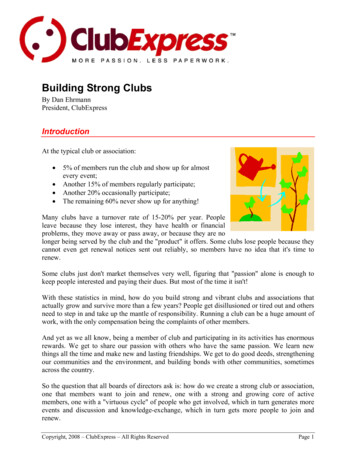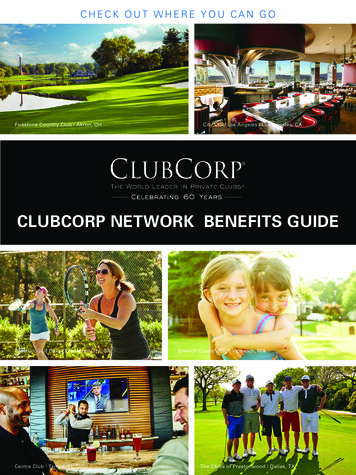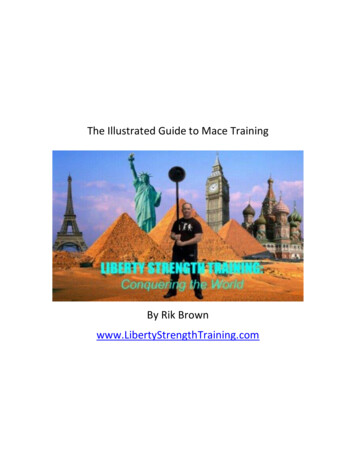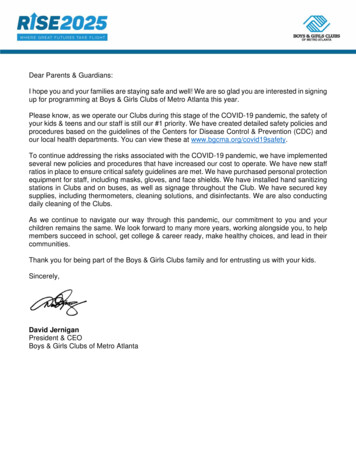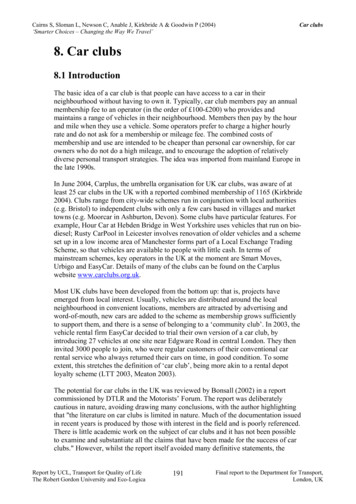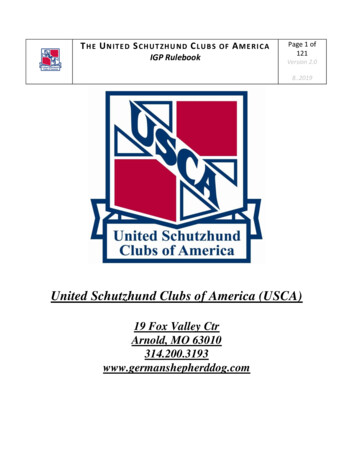
Transcription
T H E U N ITE D S C H U TZ H U ND C LU B SOFA ME RI C AIGP RulebookPage 1 of121Version 2.08.2019United Schutzhund Clubs of America (USCA)19 Fox Valley CtrArnold, MO 63010314.200.3193www.germanshepherddog.com
T H E U N ITE D S C H U TZ H U ND C LU B SOFA ME RI C AIGP RulebookPage 2 of121Version 2.08.2019USCA Trial Rulebook2019 International Utility DogRegulations (IGP)The following information / regulations are use at allUSCA Events effective 1/1/2019 (USCA version: 2.0)the content is from the FCI Utility Dog Regulationseffective 8.1.2019 and edited for use in USCA Events
T H E U N ITE D S C H U TZ H U ND C LU B SIGP RulebookOFA ME RI C APage 3 of121Version 2.08.2019United Schutzhund Clubs of America (USCA) is a full member of the WUSV and promotesmaintaining the working heritage of the German Shepherd Dog through the use of WorkingDog Trials, Breed Surveys and Shows. USCA promotes the use of humane, approvedmethods of training and handling all breeds of dog for show and working dog trials.For more than thirty five years USCA has been the largest German Shepherd Dog andworking dog sport organization in the United States. USCA continues to support and provideorganized clubs, events, education (Judges Programs, Helper and Track Layer Programs) toits membership hosting club to championship level events for all breeds of working dogs.Titles awarded at USCA Events are world recognized.
T H E U N ITE D S C H U TZ H U ND C LU B SIGP RulebookOFA ME RI C APage 4 of121Version 2.08.2019PREAMBLE (From FCI)For more than 35.000 years, the dog has been the companion of mankind. Through thedomestication of the dog, a close social relationship was formed with mankind and is insome respects dependent on him. With this comes a certain responsibility on the part ofman to ensure the well-being of the dog.When it comes to training the physical as well as the psychological health of the dog is toppriority. It is imperative then that the dog be handled in a fair, orderly and humane way.This also should include adequate care of the dog through proper nutrition and water aswell as maintaining his health which needs to include regular vaccinations and veterinaryexaminations. In addition to this there is an additional duty to the dog to properlysocialize him and to ensure exercise to meets his needs.During the course of history, the dog has had various jobs to help man. In the modern dayworld, many of these duties have been relegated to technology. For this reason, the dogowner has the responsibility to ensure that the dog has other activities due to the lossof past jobs as well as adequate exercise and activities that offer close contact topeople. Under this point of view the Companion Test – BH - , the versatility test for theutility dog, the tracking test – FH – and the article search test – StPr – need to befactored in. The dog should be occupied according to his abilities and capabilities.Besides adequate exercise, he should have intense work with activities that take intoconsideration his learning ability, his exercise requirements as well as his other abilities.The various forms of the dog sport provide these excellent venues. Dogs that do not haveenough activities act o u t / stand out and this may lead to problem behaviors and publiccomplaints.Any person who trains or does sport with his dog, has to undertake a method of carefultraining with the goal in mind to achieve the best possible harmony between himself andthe dog. The goal of all training is to convey to the dog what it is we want him to do insuch a way that he can understand. The harmonious relationship between man and hisdog, regardless of the dog sport one does, is the basis for all activities. To achieveharmony, it is important to honestly look at your dog and understand his abilities andlimitations.
T H E U N ITE D S C H U TZ H U ND C LU B SIGP RulebookOFA ME RI C APage 5 of121Version 2.08.2019It remains the ethical responsibility of man to raise and adequately train the dog. Theapplied methods must meet the standards of behavioral sciences, especially in regardsto the breed. In order to achieve the upbringing, training or training effect, it isimportant to use humane / proven methods for the dog that provide a clearunderstanding of the foundation for learning, testing, proofing and repetition for bothtraining and trials. Furthermore it is imperative to decline the use of techniques that donot utilize the proper training, raising and training aides. Using a dog for dog sport has tobe oriented to his capabilities, his competitive spirit and his willingness. Influencing thedogs training capabilities through the use of medication or animal cruelty must always beavoided. One must carefully acknowledge the capabilities of his dog. To demand work of adog that does not have the capability to do so, contradicts every ethical level ofconsciousness. Only someone who takes the responsibility to be a true friend to his dogwill take a healthy and capable dog to trials, competitions and training.
T H E U N ITE D S C H U TZ H U ND C LU B SOFA ME RI C AIGP RulebookPage 6 of121Version 2.08.2019TABLE OF CONTENTPreamble4General Abbreviations14Validity15General Information16Trial Season17Trial Days17Trial Organization/Secretary18Trial Supervision18Trial Judges19Permission to enter a trial20Anti-doping and vaccination regulations21Social compatibility22Trial Participants23Physically challenged handler (handicapped)23Collar requirement / Carrying a leash24Muzzle obligation24Liability24
T H E U N ITE D S C H U TZ H U ND C LU B SOFA ME RI C AIGP RulebookPage 7 of121Version 2.08.2019Vaccinations24Awards Ceremony / trophies24Working Title25Scorebook25TSB Evaluation – Phase “C” (valid for all trial levels)26Commands27International Rules / Special rules27World / Europe Championship28Disciplinary rights28Disqualification28Termination30Reasons for termination30Termination due to illness/injury31Temperament Evaluation / Behavioral Faults31Results of the temperament test33Conducting the identity check33Dogs that do not show gun-sureness34
T H E U N ITE D S C H U TZ H U ND C LU B SOFA ME RI C AIGP RulebookPage 8 of121Version 2.08.2019Evaluation35Point table35Calculation of percentage35Point table - Individual tests36Helper Regulations36Companion Dog test with traffic safety part BH-VT43Examination in traffic43General Information43Examination procedures44Encounter with group of persons44Encounter with Bicyclists44Encounter with Cars45Encounter with joggers or inline skaters45Encounter with other dogs45Phase A – Tracking. General Rules47Instruction: Only IFH 1, IFH 2 , and IGP FH:48Instruction: Only IFH-2 and IGP-FH:49
T H E U N ITE D S C H U TZ H U ND C LU B SOFA ME RI C AIGP RulebookPage 9 of121Version 2.08.2019Tracking Grounds49Laying the Tracks49Articles50Indicating the Articles50Pick up/ Retrieve50Track with a tracking line or free track51Tracking line51Free Tracking51Report in/ Report out51Working the on53Further evaluation criteria/responsibilities of the Judge (LR):53Deductions for all examination levels54Phase B –Obedience:55Commands:55Additional Commands:56
T H E U N ITE D S C H U TZ H U ND C LU B SOFA ME RI C AIGP RulebookPage 10 of121Version 2.08.2019Distribution and Point values ofthe exercises in the individual levels57Exercises in IGP-V58Start and end of an exercise58Basic Position58Buildup59Pick Up59Recall / Front / Finish59Praise59Incorrect Positions59Releasing the Dumbbell upon command60Dumbbell60Hurdle60Scaling Wall61Exercise descriptions:61Heeling on Leash and Free Heeling61Heeling Pattern Diagram:63Execution63Sit out of Motion (all Examination levels):64
T H E U N ITE D S C H U TZ H U ND C LU B SOFA ME RI C AIGP RulebookPage 11 of121Version 2.08.2019Down with Recall65Stand while Walking IGP-266Stand out of Motion (IGP-3 only)66Retrieve on the Flat67Basic Position in Front of the Hurdle and scaling wall68Retrieve over the 1m hurdle68Climbing over the scaling wall (IGP-1 only)69Retrieve over the scaling wall70Send out with Down71Down under Distraction72Praise72Mandatory Deductions73Phase C - Protection (IGP 1-3):74General Provisions74Field Markings74Blinds74Basic requirements74Evaluation criteria75
T H E U N ITE D S C H U TZ H U ND C LU B SOFA ME RI C AIGP RulebookPage 12 of121Version 2.08.2019Extra Commands – Deductions76Examination Levels IGP-1 to IGP-3 (Exercises and Points Values)77Report in78Search for the helper78Hold and Bark (10 points for Hold and 5 points for Barking)79Prevention of an attempted escape of the helper81IGP-181IGP-2 and IGP-382Defense of Attack from Guarding83End of the exercise83Back Transport IGP-284Back transport IGP-384Attack on the dog from the Back Transport IGP-3 only85Attack on the dog out of Motion86Defense of an attack from the guarding phase,with completion of phase C - IGP-2 and IGP-389IGP-V91Tracking 1 – 3 (FPr 1 – 3)93
T H E U N ITE D S C H U TZ H U ND C LU B SOFA ME RI C AIGP RulebookPage 13 of121Version 2.08.2019Obedience 1 – 3 (UPr 1 – 3)94Working dog test 1 to 3 (GPr 1-3)94Article Indication Trial 1 – 3 (StPr 1 – 3)95AD99Tracking Diagrams102-106Track Laying107Blind Search109Setup for Prevention of an Escape109Hurdle110Scaling wall111Dumbbells111Out of Motion Exercises additional information / diagram112Escape additional information / diagram117Search Exercise additional information114Additional Disqualification / Termination information119
T H E U N ITE D S C H U TZ H U ND C LU B SOFA ME RI C AIGP RulebookPage 14 of121Version 2.08.2019General abbreviationsUSCA – United Schutzhund Clubs of AmericaWUSV – World Union of German ShepherdsFCI – Federation Cynologique InternationalIGP-International Utility Dog trial regulations (International Gebrauchshund Prufung-International Working Test)USCA – United Schutzhund Clubs of America (LAO National Organization)L - Trial SecretaryAKZ – Training degreeLR – Trial judgeGST- Basic PositionPO - Trial regulationsRA - Judge InstructionHZ - Verbal CommandHL - HelperHF - Dog HandlerFL - Track LayerJC – Judges CommitteeEB – USCA Executive Board
T H E U N ITE D S C H U TZ H U ND C LU B SOFA ME RI C AIGP RulebookPage 15 of121Version 2.08.2019Validity of Rules (Regulations)These Regulations are effective from 01.01. 2019. The original regulations were drawnup by the FCI Utility Dogs Commission and were approved and confirmed by the FCIGeneral Committee in February 2018 and accepted for use by the WUSV. The followingrulebook is adapted for use in USCA Trials / events.Effective 1.1.2019 all previous rules lose their validity as they apply to for specific titles.The original regulations were drawn up and worked out by the Commission in German.These Regulations (IGP) are valid for all FCI members and contract partners.This version USCA Trial Rules has been edited for use in USCA Events. All edits or correctionsdo not alter the fundamental description of any exercise or title. All titles earned at USCAevents using this rulebook are valid and recognized by the WUSV and FCI.USCA variances are previously approved by the EB or JC some are due to liability or forpractical application at USCA Events, they do not change the fundamental purpose of theexercises or validity of any title. Please refer to the published USCA Preface / VariancesRulebook (separate) for additional information. Edits / changes / clarifications in thisrulebook differing from the FCI Utility Dog Regulations are either highlighted or underlinedin this text.This rulebook version is approved for use by USCA effective starting 8/1/2019.Nathaniel Roque , USCA Director of Judges,Original IGP rulebook reviewed by the USCA Judges Committee-Vadim Plotsker, MikeGardner, Michael Caputo, Gary Mcgillivary.
T H E U N ITE D S C H U TZ H U ND C LU B SIGP RulebookOFA ME RI C APage 16 of121Version 2.08.2019General information:Trial events and competition should serve two purposes.1.2.After passing a test, the individual dog should receive recognition/ titleawarded for its’ particular purpose.Contribute to the overall health, fitness and work ethic of the dog.The United Schutzhund Clubs of America (USCA) promotes the Working Dog Trialswithin the United States of America (under International Utility Dogs Regulations,IGP) USCA Club and Championship events will be conducted using this rulebook.International competitions should be conducted under the International Utility DogsRegulations concept (IGP). All trials and competitions are subject to propersportsmanship with regard to the conduct of the participants. These regulations arebinding. All participants have to meet the same working / performancerequirements of an exercise (adjustments may be made for ADA Handlers as long asit does not change the fundamentals of the exercise / test. The same handler anddog for all phases). The trials are to be made public by listing on the USCA website /magazine and minimum 21 day notice of the event with the place and start time to themembership.Trial events and competitions must correspond with complete trial levels or individualcompleted phases of the respective trial levels. Only a completed trial level passedin all of its phases in an event will b e a w a r d e d a title. The titles a w a r d e db y U S C A must be accepted by all WUSV member organizations and theirpartners in all countries.Every trial level can be repeated as many times as wanted. The trial levels must becompleted in order (Level 1 – 2 – 3 with exception for TR/FPr, OB/UPr, FH V, FH,FH2). The dog can only be shown in the next level after successfully passing theprevious level with a minimum rating of satisfactory in each phase. The dog must beshown in the highest level passed for competitions. Exception, when there is noranking or qualification “repeater “is connected to the trial. Dogs repeating titles ata lower level may not be awarded higher ranking for awards than a dog earning atitle for the first time excluding IGP3, FH2, IGP FH.
T H E U N ITE D S C H U TZ H U ND C LU B SOFIGP RulebookA ME RI C APage 17 of121Version 2.08.2019Trial Season:Trials may be conducted year round if weather conditions are conducive and thewell-being of both handler and dog are not at risk. Otherwise, the event cannot beheld. This is the sole decision made by the trial judge (LR). The individual nationalorganization can impose restrictions regarding the trial season for their area (USCA trialseason is year-round).Trial Days:a) Saturday, Sunday and HolidaysTrial days are generally on the weekend as well as legal Holidays. BH/VT tests can also onlybe done on official trial days.It is possible to trial for the BH/VT and the IGP-1/IFH-1 tests in tandem with a two day trial(Friday-Saturday), (Saturday-Sunday) at one or 2 different clubs. A waiting time betweenthe BH/VT and IGP-1/IFH-1 does not exist. Example: Friday Saturday BH, Sunday SaturdayIGP-1 or IFH-1b) Friday TrialsA Friday trial day may only be in tandem with a Saturday trial.Remark: Friday can only be authorized if more dogs are presented on Saturday thancan be accommodated. Start time is not before 12:00 noon on Friday. A Friday trial intandem with a Saturday trial secured for IGP/IFH tests must end on Saturday unlessthere are enough dogs to fill Sunday or meets other USCA variances or authorizations.Individual dogs may also complete their trial on Friday.Exception: If participants, who plan on trialing their dogs for IGP-1 or IFH-1 onSaturday / may start on Friday for the BH/VT and then on Saturday they may test forIGP-1 or IFH-1. This does not cause “overage” in the number of participants. Clubs mustfollow the event authorization guidelines per USCA authorization.c) Holiday regulationsSee USCA variances for authorization
T H E U N ITE D S C H U TZ H U ND C LU B SIGP RulebookOFA ME RI C APage 18 of121Version 2.08.2019Trial Organization / Trial Secretary :The Trial Secretary is responsible to organize the event. He/she finalizes and supervisesall required levels ofWork (paperwork, fliers, location and equipment) to prepare and conduct a trial. He/shemust guarantee the orderly execution of the event and must be at the judge’s disposal forthe duration of the event.The Trial Secretary (PL) may not show a dog in the trial. He/she is responsible for:obtaining all event documents required - the event authorization, necessary eventdocuments (judges’ sheets, trial paperwork, scorebooks, helper and tracklayer books ifapplicable).Trial equipment (flags, articles, jump, wall, gun, blinds, helper equipment) locatingsuitable tracking fields for all trial levels according to the rules. Make arrangements forapproval with the property owners of the tracking fields and venue.Provide a safe suitable trial field for the obedience and protection that meets theminimum size requirements to properly show all exercises (see USCA Preface /varianceand guidelines for requirements). Provide experienced volunteers for the event such asclassified helpers for protection, tracklayers and group, etc.A minimum of one week (7) days in advance, the Trial Secretary (PL) must inform thejudge (LR) the location, start times, directions, type of trial and number of dogs entered.Failure to provide this information may result in the judge (LR) declining to officiate andthe host club responsible for any fees due. The event authorization is to be provided tothe judge (LR) prior to the start of the trial.Trial SupervisionThe United Schutzhund Clubs of America is entitled to supervise it events. USCA mayassign a knowledgeable person to oversee an event to ensure that the event is conductedin accordance with the regulations as stated in the 2019 USCA Trial Rulebook.
T H E U N ITE D S C H U TZ H U ND C LU B SIGP RulebookOFA ME RI C APage 19 of121Version 2.08.2019Trial JudgesJudges, who are authorized to judge a USCA event are USCA licensed judges or foreignjudges (residing outside USA) that are SV Licensed and or FCI licensed from a WUSVmember organization. These may be invited by the host club with approval by of theRegional Director an DOJ. For USCA National Championships, the judges will be approvedby the USCA Executive Board. The number of judges (LR) invited for a trial is up to thehosting club up to one judge per phase. Trial judges (LR) are not permitted to judge dogsthat are owned by him or are in his possession, or dogs whose owners reside with them(spouse / partner) USCA variance for championships allows a person of the samehousehold to enter.A trial judge is not permitted to handle a dog in a trial in which he is officiating as a judge.The trial judge (LR) is not permitted to disturb or influence the work of the dogthrough his behavior. The trial judge (LR) is responsible for the compliance and correctadherence to the governing rules. He is authorized to terminate the trial for failure ofcompliance of the rules and/or his instructions. In such cases, the judge must providea written report to the Judges Committee of USCA or the National Organization if a worldchampionship authorizing the trial.The trial judge is authorized to disqualify a handler in the event of unsportsmanlikebehavior, carrying of motivational articles, non-compliance with the rules, non-compliancewith animal rights guidelines, and anything against the local laws. A prematuretermination of a trial must be documented in the scorebook. In the event of adisqualification all acquired points will not be recognized. The judge must notify the DOJor Assistant DOJ of unsportsmanlike behavior.The judge’s decision is final and incontestable. Any form of criticism concerning thedecision, can lead to dismissal from the site and eventually lead to disciplinary measures.In justified cases, not based on factual decisions (judges evaluations / scores), rather byclear violations of the rules by the judge (LR), a notarized complaint may be submittedwithin 8 days of the occurrence to the USCA Judges Committee. This complaint must bemade in writing, whereby the plaintiff and at least one witness signs it and submits itvia the trial secretary of the hosting club or USCA. Filing a complaint does notautomatically lead to a dismissal of the judge’s decision. The decision concerning acomplaint is determined as outlined in the USCA Judges Program/USCA BOI or the EB.
T H E U N ITE D S C H U TZ H U ND C LU B SOFA ME RI C AIGP RulebookPage 20 of121Version 2.08.2019Permission to enter a trialOn the day of the trial, the dog must have met the minimum age required. Noexceptions are permitted. The dog is required to have passed the BH-VT in accordancewith the rules set forth by USCAAvailable titles offered by USCA listed belowThe minimum required age limit for BH/VT in USCA is 15 months.NeededN/AMinimum Age15 monthsBH-VTBH-VTIGP-1IGP-2BH-VTBH-VTIFH-1BH-VT15 Months18 Months19 Months20 Months15 Months18 Months19 Months20 MonthsF. Pr. 1-3U.Pr. 1-3G.Pr 1-3BH-VTBH-VTBH/VT15 Months15 Months15 MonthsIADBH-VT16 FHAdditional Titles offered are RH 1-2 internationally recognized by the FCI, WUSV and IRO.only events and recognized by USCA.The exercises TR/FPr 1-3 take place according to the IGP 1-3 Rules for Phase A, theexercises OB/UPr 1-3 take place according to the IGP 1-3 Rules for Phase B. The exercisesGpr 1-3 take place according to the IGP 1-3 Obedience and protection Rules for PhaseB&C.
T H E U N ITE D S C H U TZ H U ND C LU B SIGP RulebookOFA ME RI C APage 21 of121Version 2.08.2019These titles TR/FPr, OB/UPr ( e x c l u d i n g p r o t e c t i o n o n l y w h i c h i s n o to f f e r e d a t U S C A t r i a l s ) can be tested as single phases (these do not have to beearned in secession they may be awarded in any order. These titles are not an officialb r e e d i n g t i t l e o r working title. Trials with only a protection phase are notpermitted in USCA.The dog handler can chose in which level of these trials levels (TR/FPr, OB/UPr) he/she willstart without a previously passed lower level. Dogs regardless of size, breed or heritagemay participate in a trial. The dog must be in g o o d physical condition to completethe requirements of the IGP.Females in heat may participate at all trial events, however, must be shown separatelyfrom the other handlers’ dogs. In phase A, they will track with the other dogs entered inthe trial, but in the remaining phase / phases they will be shown at the end after allother dogs have completed the trial. Females, who are visibly pregnant or who arenursing or who have puppies with them, may not be trialed specifically from the 19th dayafter the day of breeding. This is valid until they complete the 12th week after the day ofbirth. Entry between the 8th and 12th week may be possible at the judges’ decision.Sick and dogs suspected of contagious disease are excluded from all trial events. In caseof doubt, the veterinarian will make the final decision. Dogs may not show with braces,bandages, or other signs of injury.Anti-doping and vaccination regulationsA dog registered by his owner for participation in a competition and placed by him or thedog handler in the trial must be clear of all drugs in his tissues, his body fluids and hisexcretions on the day of the event to include all substances which are listed on thebanned substance list of the FCI or United States standards.The list of substances, the procedure for the testing for banned substances, and thepossible penalties for infringements are published in a corresponding set of rules of FCI.USCA -United Schutzhund Clubs of America may extend these provisions with their ownrules and regulations. All dogs must have a rabies vaccination certificate as well as state,local or national vaccinations as required by the local laws and regulations.
T H E U N ITE D S C H U TZ H U ND C LU B SOFA ME RI C AIGP RulebookPage 22 of121Version 2.08.2019Social compatibilityA dog that, at any time during the competition (before, during or after his ownperformance) shows overly aggressive behavior as determined by the judge or USCAofficial and reported to the judge. Attacks a person or another dog, tries to bite orattempt to attack, will be disqualified from the competition on the judge’s decision. Allpoints are withdrawn and the dog is disqualified (DQ), even if the dog has completed all 3phases. In a two-day event, the disqualification also extends to the second day so that thedog cannot start or continue in the trial. (DQ dog must repeat BH before entering anothertrial and a report made to DOJ)In cases of dog aggression, immediate disqualification (DQ) occurs. Before the dog mayenter another trial, the dog owners / handler have to prove during a trial or at acompetition that the team (dog) has again successfully participated in a BH-VT withbehavior test. The disqualification shall be entered by the performance judge in all theperformance records / score books, pedigree known to him and signed by him. TheUSCA Dog Aggression Policy will be enforced which may carry additional sanctions asrecommended by the Judges Committee and Executive Board.Phases per day per Trial levelFPr, UPrGPr 1-3IFH-V / Tracking suitabilityIFH-1, IFH-2 and IGP-FHBegleithundeprüfung (BH-VT) / CompanionexaminationIGP-Vorprüfung(V) / IGP V- SuitabilityIGP 1 - 3STp - Stöberprüfungen 1-3 / Article search 1-3AD - Endurance Testequivalent to 1 phaseequivalent to 2 phasesequivalent to 1 phaseequivalent to 3 phasesequivalent to 2 phasesequivalent to 2 phasesequivalent to 3 phasesequivalent to 1 phaseequivalent to 1 phaseAWD – American Working Dog TitlesIPO – for USCA only Breed programequivalent to 3 phasesequivalent to 3 phasesFor Championships (Regionals, Nationals, WDC) scheduled by USCA special regulations arebe established i.e. increased phases per day per judge, scheduled days of the event etc.
T H E U N ITE D S C H U TZ H U ND C LU B SIGP RulebookOFA ME RI C APage 23 of121Version 2.08.2019Trial ParticipantsThe trial participant must meet the entry deadline for the event. The participant alsoagrees to pay the entry fee on submission of the entry form. If the participant cannotparticipate for whatever reason, he/she must advise the Trial Secretary immediately. Theparticipant is required to provide the vaccination certificate and uphold the animal rightsguidelines if requested by the host club. The participant must adhere to the instructions ofthe judge as well as the Trial Secretary. The handler must present his/her dog in asportsmanlike manner regardless of the results in any given phase; he/she is obliged tocontinue for the remaining phases of the event unless receiving a DQ. The trial ends withthe results (awards ceremony) and the return of the scorebook.The same dog handler must handle the dog in all phases of the trial. A two-day trial isconsidered t o b e one event/trial). A dog handler may enter a maximum of three (3)dogs for a club trial and two (2) for a championship event. A dog may only acquire oneworking title within an event. (FPr/UPr are not working titles and may be done in thesame trial). Exception: BH / VT in conjunction with another level 1 title (done on separatedays). Prerequisite for entering a trial is that owner and dog handler belong to a cluborganization that is recognized by USCA (WUSV or others as approved). Exceptions to thiscan be determined by USCA.Physically challenged handler (handicapped)If a dog handler cannot carry out part of an exercise correctly due to a physical handicap,he must inform the performance judge (LR) before the start of the trial. If due to aphysical handicap the dog handler cannot present the dog on the left side of the doghandler, the dog may be presented in the same way on the right side. U S C A may alsoadd further restrictions for the safety of the trial but at all times will support the ADA aslong as it allows the handler/dog team to complete exercises safely as a team. Thehandler must be present with the dog in all phases entered, giving commands and showingthe fundamentals of the exercise or phase. There must be a person/assistant present onthe trial field with a leash to accept the responsibility to leash and control the dog.
T H E U N ITE D S C H U TZ H U ND C LU B SIGP RulebookOFA ME RI C APage 24 of121Version 2.08.2019Collar requirement / Carrying a leashThe single row, loose fitting large link collar (fur saver, full size links and minimum1.5”) must be worn throughout the trial. The BH / VT allows the use of other types ofcollars to include leather collar, fabric collar or chest harness. For the tracking phase, adog may wear a tracking harness or a vest in addition to the required loose fitting largelink collar.A leash must be carried for the duration of the trial (ADA -in the situation of ahandicapped handler an assistant must be on the field with a leash and accept theresponsibility to leash and control the dog if the handler cannot do so). It may be outof sight or worn by the handler over the shoulder or around the waist with theclip on the side opposite to the dog’s working side.Muzzle obligationThis is not allowed in USCA event, all dogs must be able to be shown without amuzzle.LiabilityThe owner of the dog is liable for any personal injury or material damage caused byhis/her dog. Therefore, he/she must have adequate in sura nce coverage for suchcases. In the event of an accident during the trial, the handler is liable for himself /herself and his / her dog. The handler is to follow the instructions of the judge and theorganizing club takes responsibility for their actions showing their dog athis/her own risk.VaccinationsProof of vaccinations as performed by a certified authority (vaccination certificate) ifrequested by the host club in advance (during entry process) must be presented to thetrial secretary or judge.Awards Ceremony / trophiesAward ceremonies are to be held separately for the various trial phases. If the samenumber of points are awarded to more dogs
19 Fox Valley Ctr Arnold, MO 63010 314.200.3193 www.germanshepherddog.com , THE UNITED SCHUTZHUND CLUBS OF AMERICA, IGP Rulebook , Page 2 of 121 , Version 2.0 , 8.2019, USCA Trial Rulebook , 2019 International Utility Dog Regulations (IGP) ,
